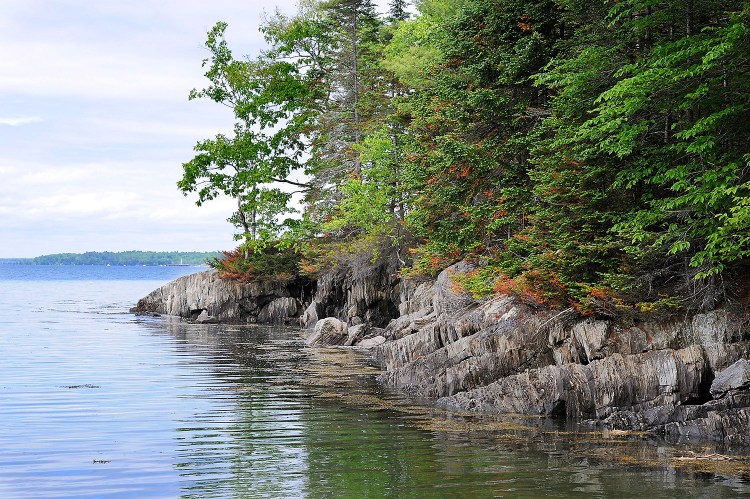AUGUSTA — Conservation and outdoor recreation groups are recommending that Maine borrow $95 million to dramatically increase land protection efforts and tackle a backlog of repairs and improvements in the state park system.
The $95 million bond proposal, which would replenish the Land for Maine’s Future program, is among more than a dozen recommendations released Tuesday by a broad coalition that met last year to shape “a new generation of land conservation in Maine.” The 20-member task force – led by representatives of Maine Coast Heritage Trust and the Maine Sportsman’s Alliance – also called for strengthening Maine’s landowner relations programs and explore ways to create a steady, reliable revenue stream for state parks.
“Most of the people on the panel came from different perspectives . . . but in the end I believe we produced a product that will get land conservation in Maine back on track,” said David Trahan, executive director of the Maine Sportsman’s Alliance.
The task force timed its work to coincide with the political change-over in Augusta after eight tumultuous years under Republican Gov. Paul LePage, a vocal critic of Maine’s conservation community.
One of the report’s key recommendations to the Legislature is to send a $95 million bond proposal to Maine voters. The proposal would earmark $75 million to the Land for Maine’s Future program – which uses taxpayer-backed bonds to leverage private or federal matching dollars for conservation projects – as well as $20 million to Maine’s state parks.
There is strong, bipartisan support in the Legislature and from the administration of Gov. Janet Mills for a bond package to support the LMF program, which is geared toward protecting public access to recreational lands or preserving valuable farmlands and working waterfronts. Since 1987, the program has protected from development more than 1,200 miles of shoreline, 9,700 acres of farm land and more than 570,000 acres of conservation and recreation lands.
Task force member Sen. Cathy Breen, a Falmouth Democrat who co-chairs the budget-writing Appropriations and Financial Affairs Committee, pointed out that 104 of the Legislature’s 186 members have signed on as co-sponsors of her bill proposing a $95 million bond.
Breen’s bond bill will compete with more than $1 billion in bond proposals that lawmakers will consider this session, most of which are unlikely to survive.
https://cloudup.com/cM60bhIh2Jv
“We definitely decided to come in with a very, very robust number, understanding that there is a lot of demand for bonds,” Breen said. “There are really valid competing needs, for instance access to the internet and some other big-dollar items that will hopefully leverage some federal funds. But I think that that’s where the negotiation and the work with the governor’s office will be really important.”
Mills wasn’t ready to endorse a specific dollar figure for LMF bonds on Tuesday but has signaled her support for replenishing the program’s coffers.
“I think the last LMF bond was 2012 and that was a small one, so there is built-up demand for this. When LMF bonds go out to a vote, people overwhelmingly support them – well over 60 percent every time for the last 25 to 30 years that they have gone out – so there is pent up demand and it is certainly a high priority,” Mills said.
The task force report cites an estimated $50 million backlog of infrastructure projects – including roads, campgrounds and buildings – in state parks. The last bond measure to finance capital improvements at state parks was in 2010, and the state has not built a significant new campground or other facility at state parks in 40 years.
Despite strong bipartisan support for the LMF program, the issue of land conservation took on political overtones under the administration of Republican Gov. Paul LePage. A vocal critic of Maine’s conservation and environmental communities, LePage held up LMF bond sales as political leverage and became personally involved in advocating against a project located just across the road from the Maine State House.
Mills, a Democrat elected last November, said she was “pleased to see consensus-building of this sort and coalition building, and I would like to see a lot more of it in this building.” Mills said she was also pleased to see the task force’s recommendations on improving relations with landowners that provide public access, on building momentum for LMF funding and supporting Maine’s “heritage” industries of fishing, farming and forestry.
“Maine’s public lands are an untold gem, a treasure that is too little marketed and too little talked about,” Mills said. “Our conservation efforts need to go forward to make our land accessible to all comers.”
Send questions/comments to the editors.




Success. Please wait for the page to reload. If the page does not reload within 5 seconds, please refresh the page.
Enter your email and password to access comments.
Hi, to comment on stories you must . This profile is in addition to your subscription and website login.
Already have a commenting profile? .
Invalid username/password.
Please check your email to confirm and complete your registration.
Only subscribers are eligible to post comments. Please subscribe or login first for digital access. Here’s why.
Use the form below to reset your password. When you've submitted your account email, we will send an email with a reset code.